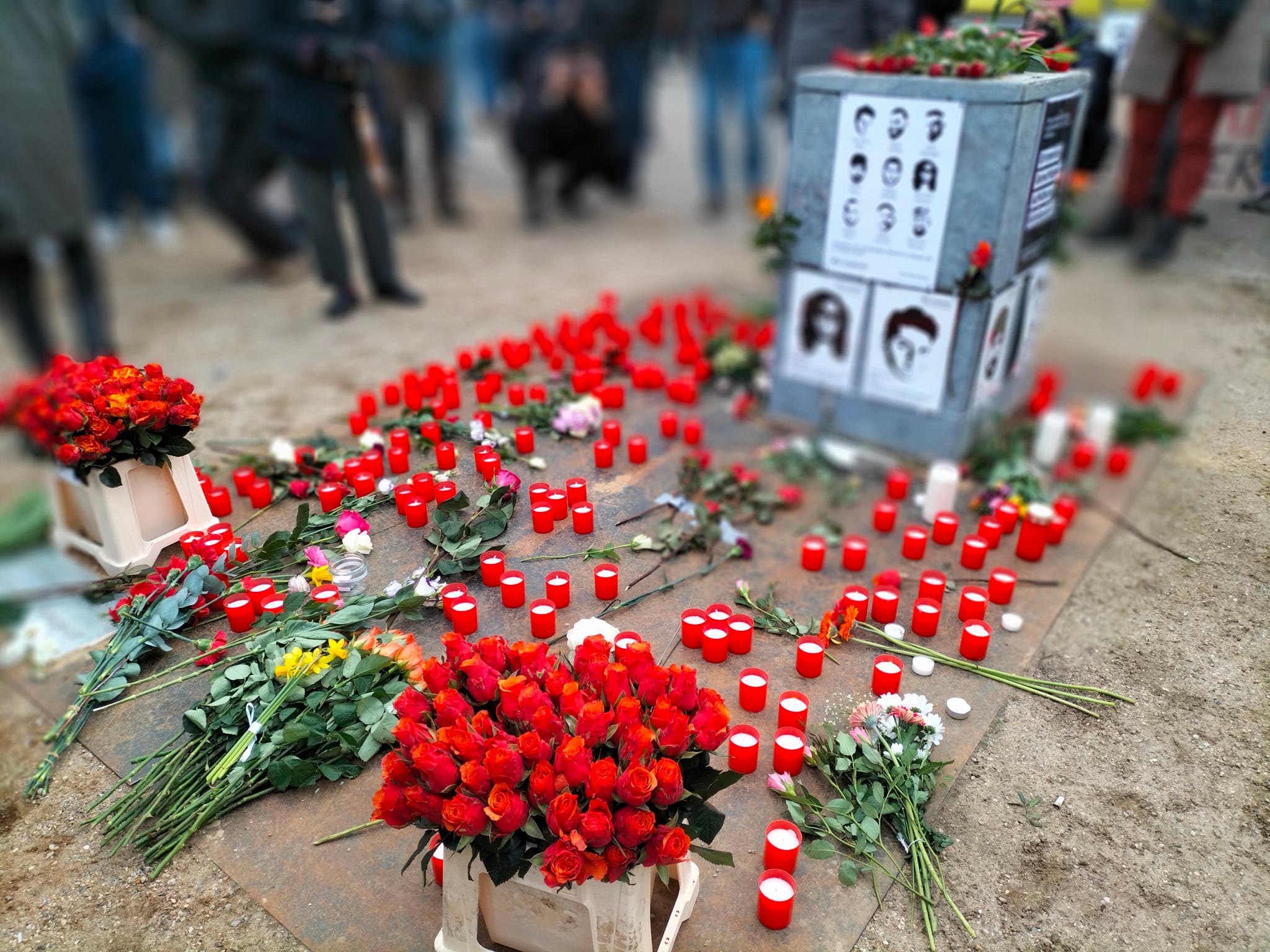
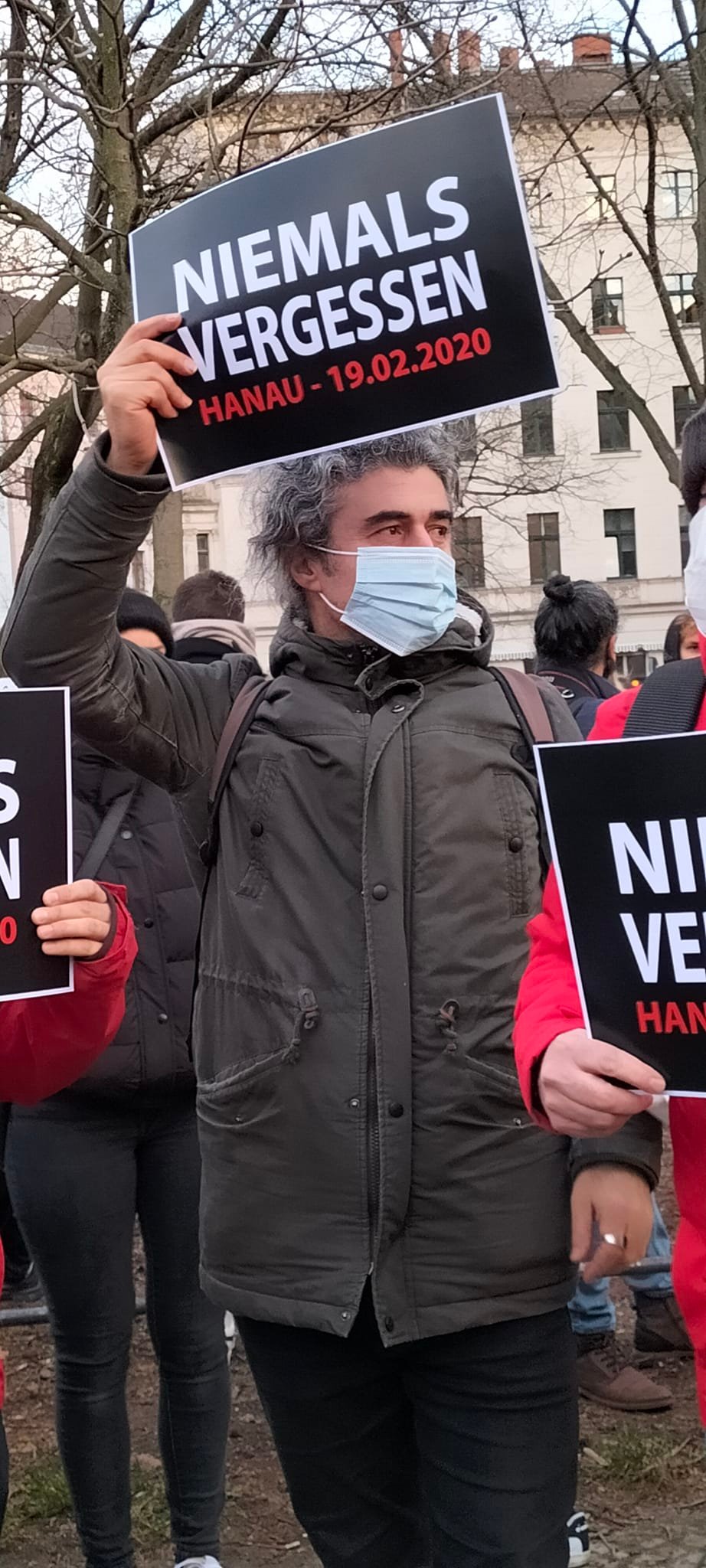
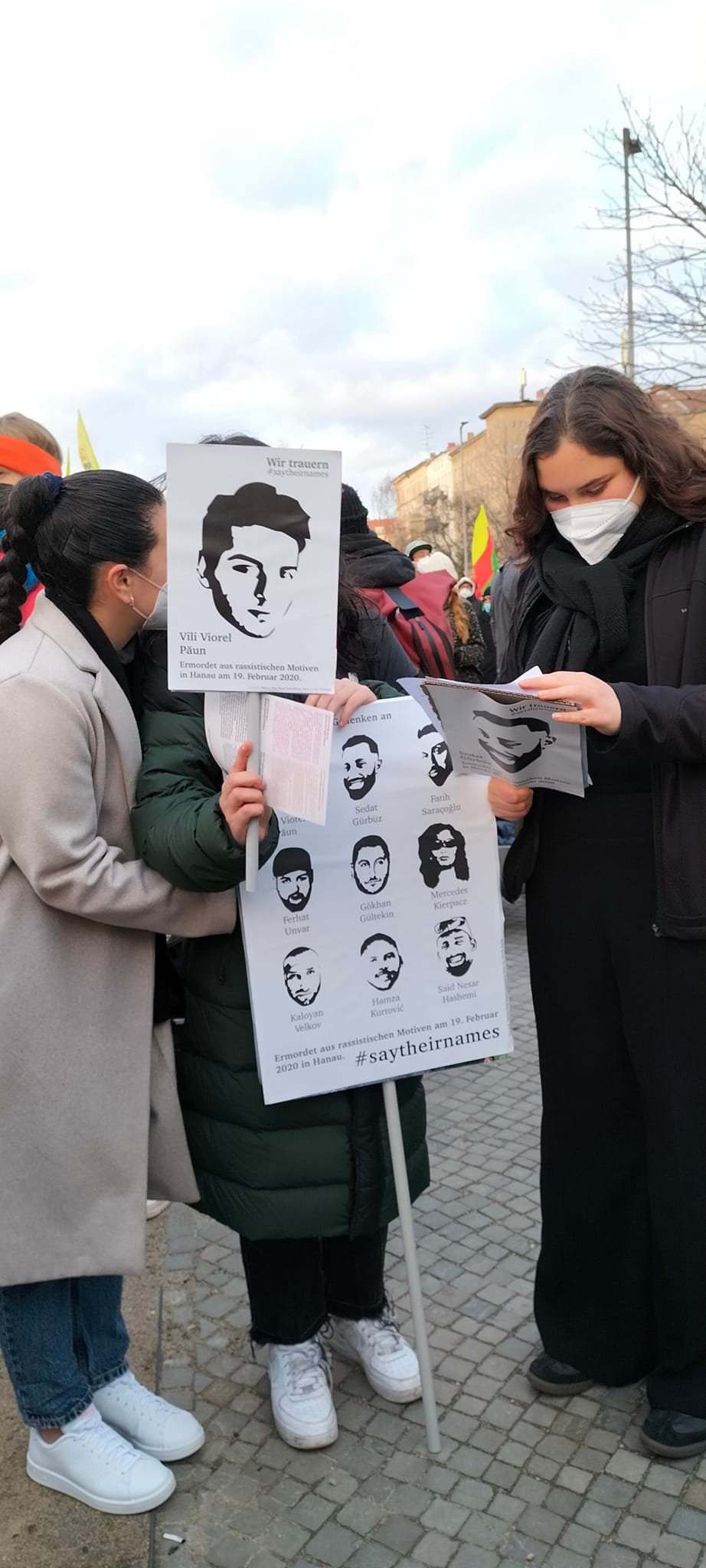
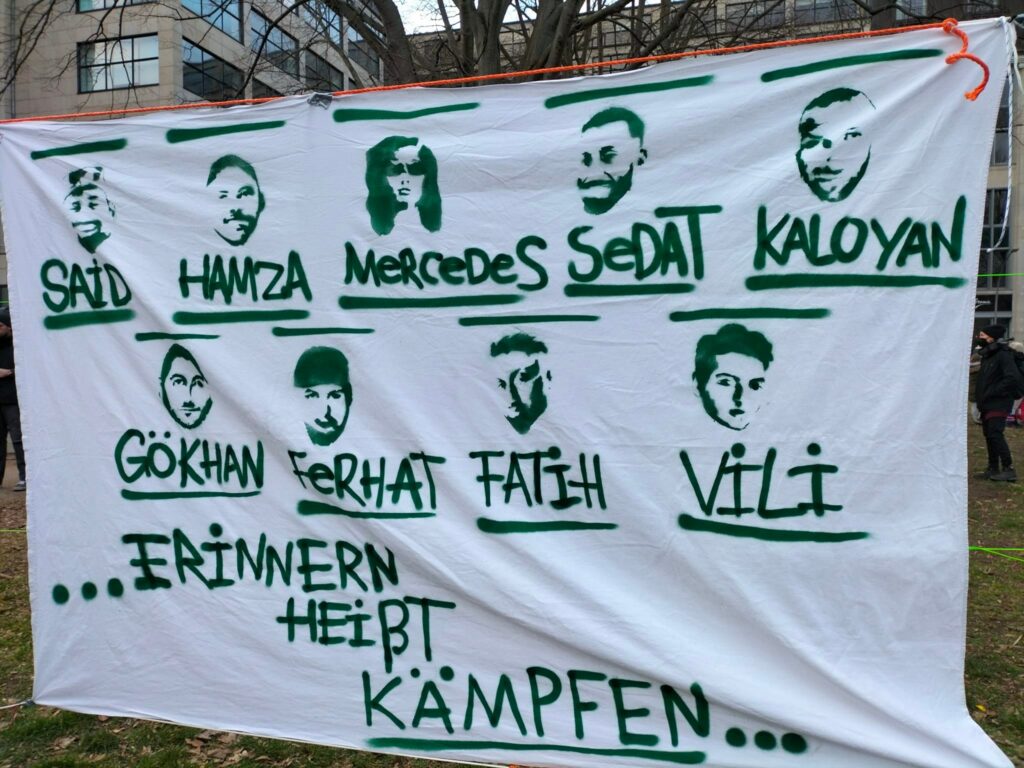
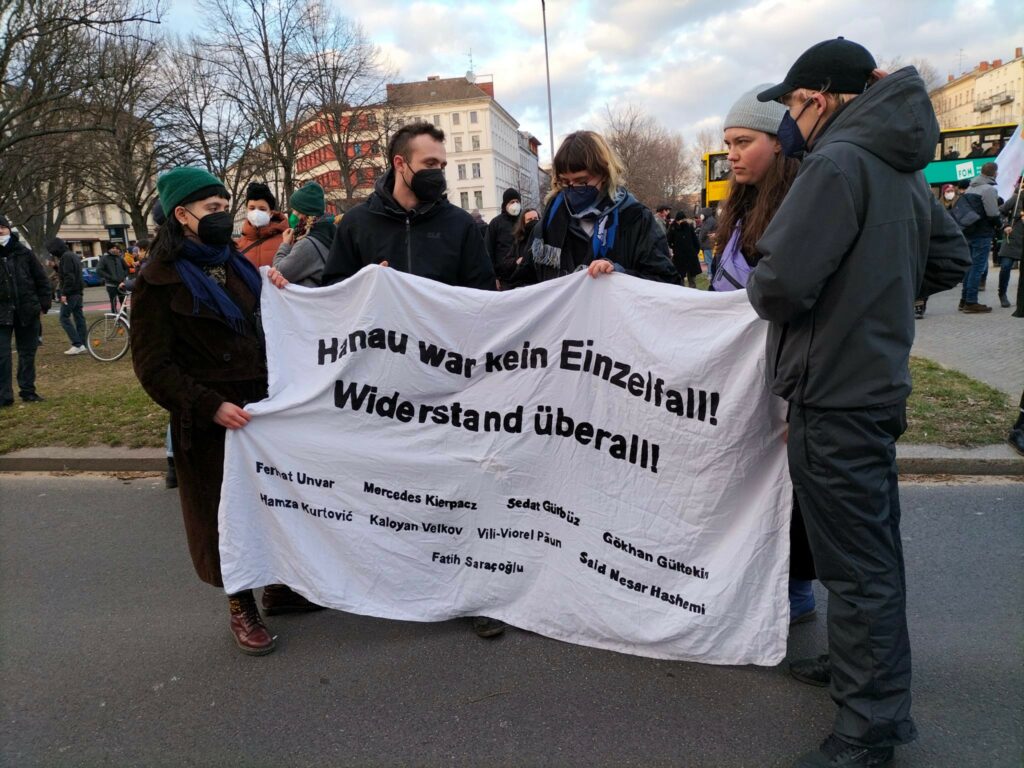
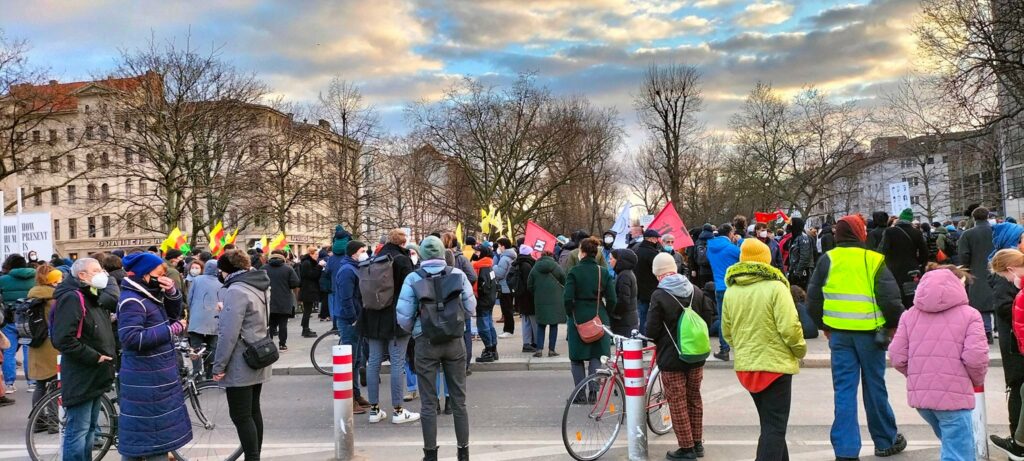
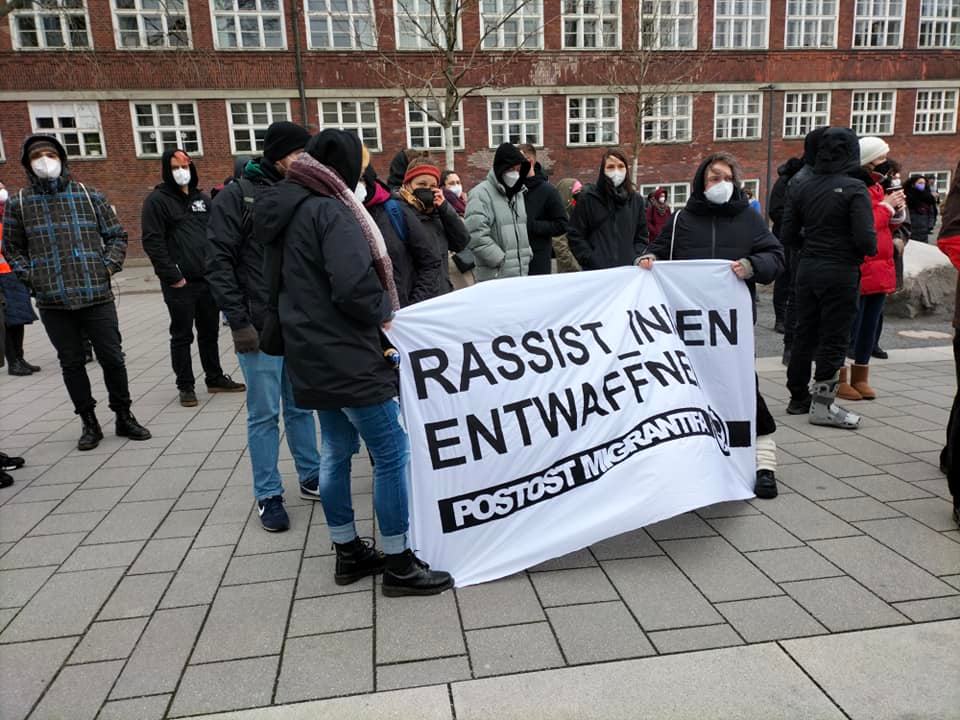
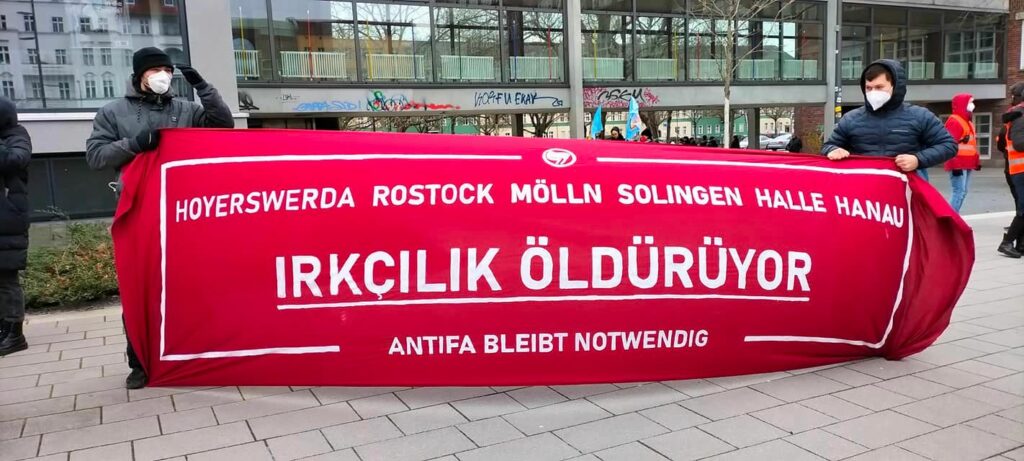
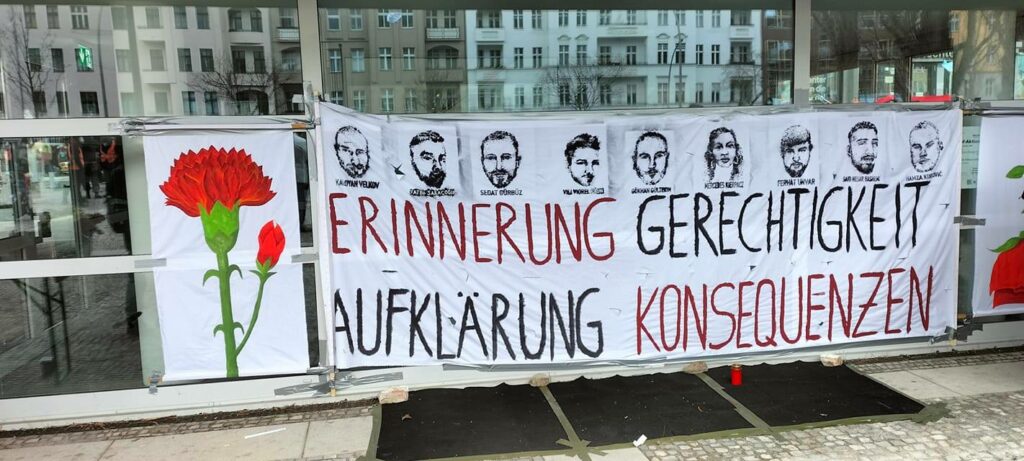
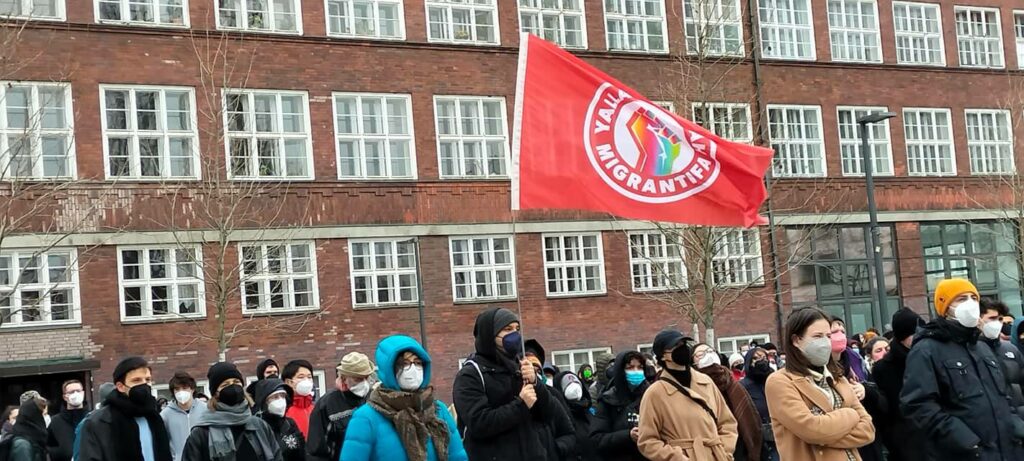
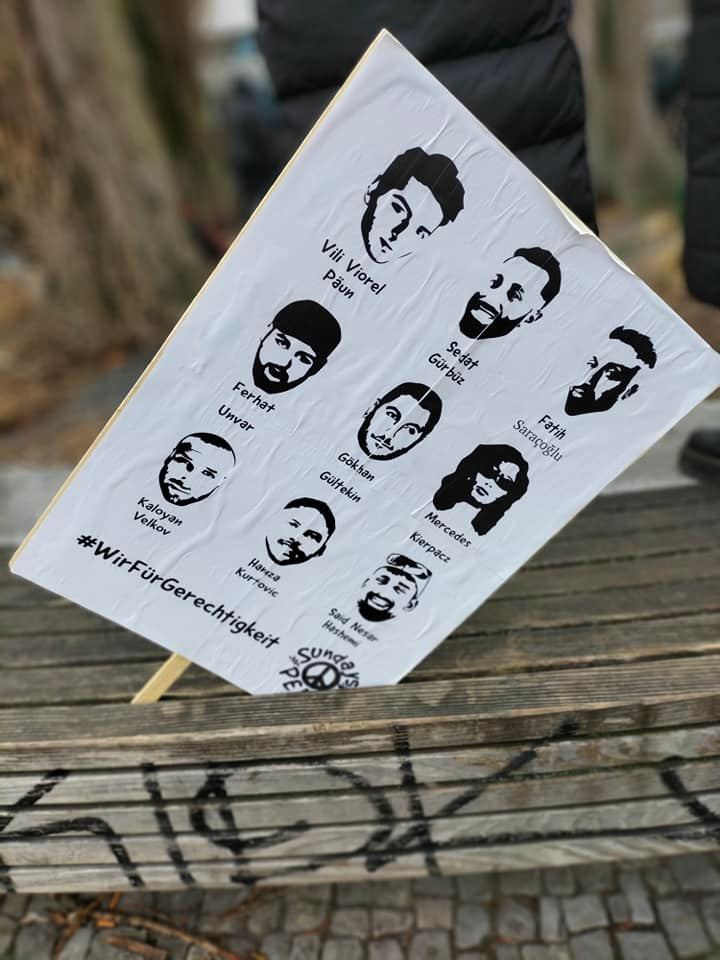
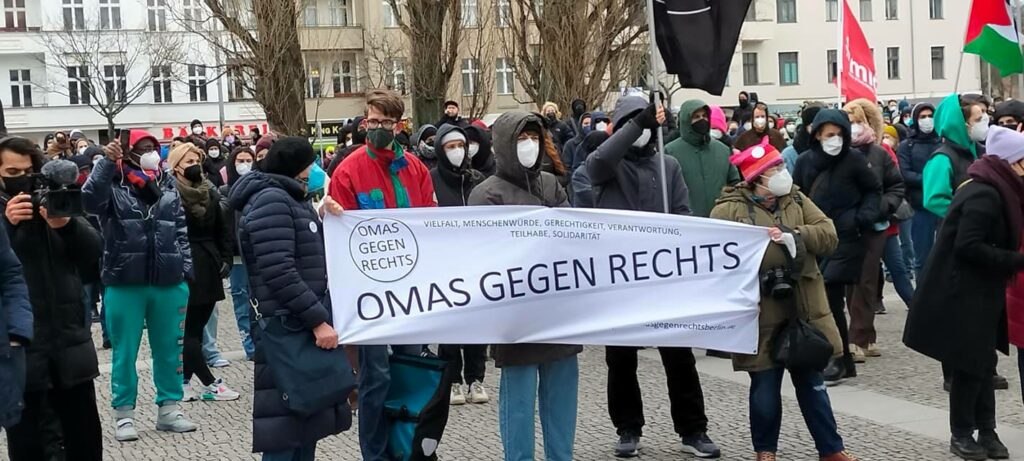
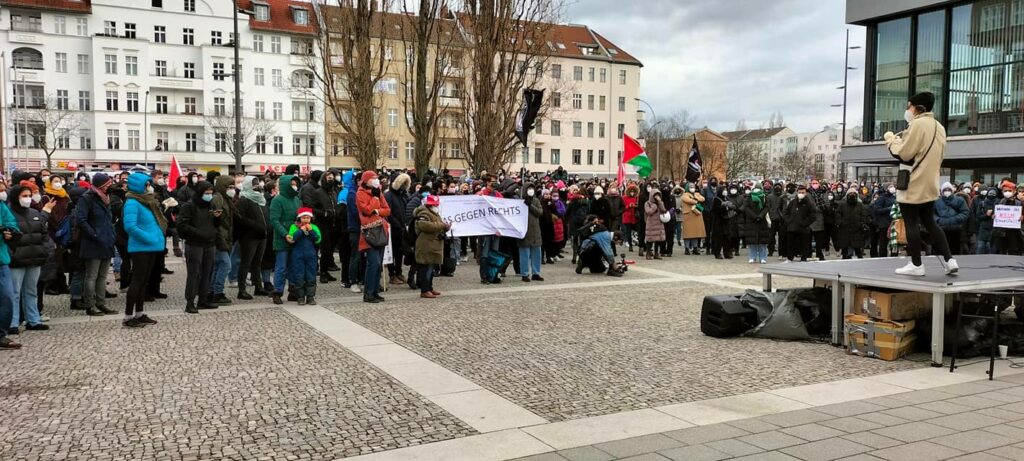
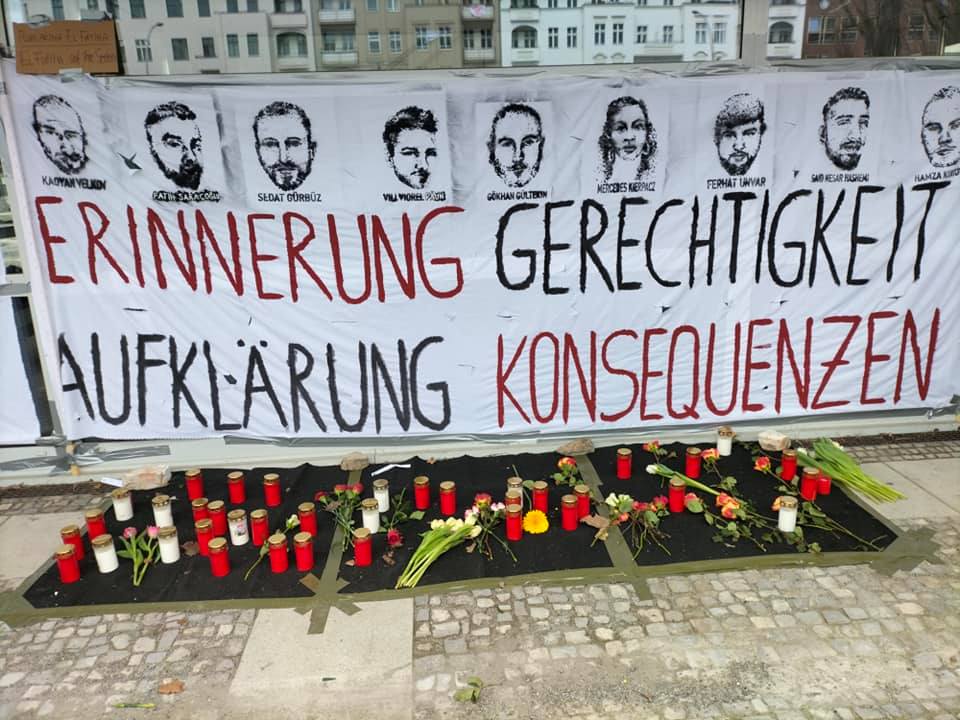
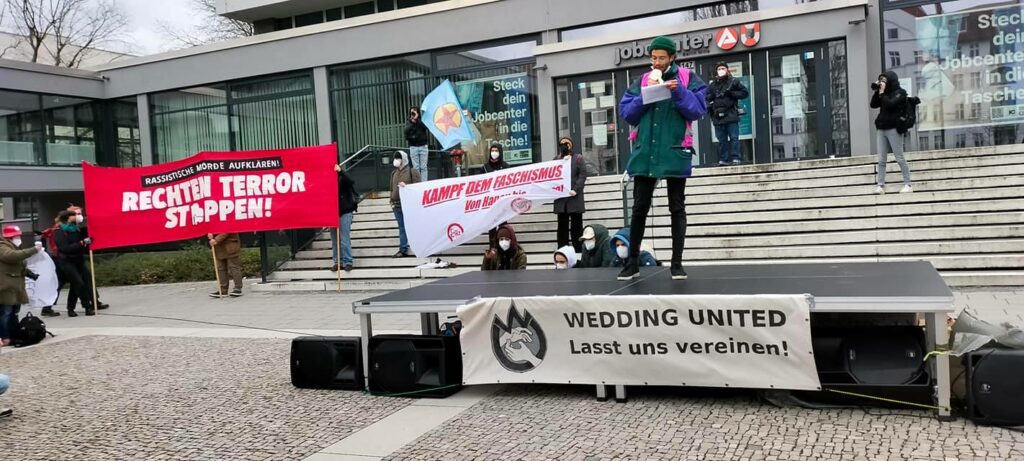
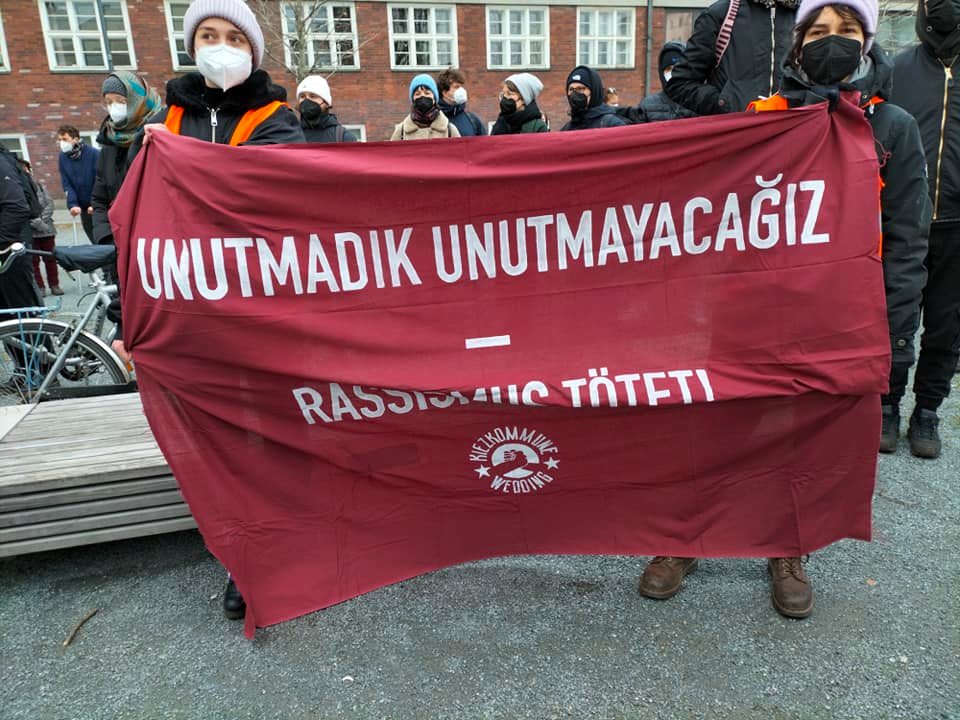
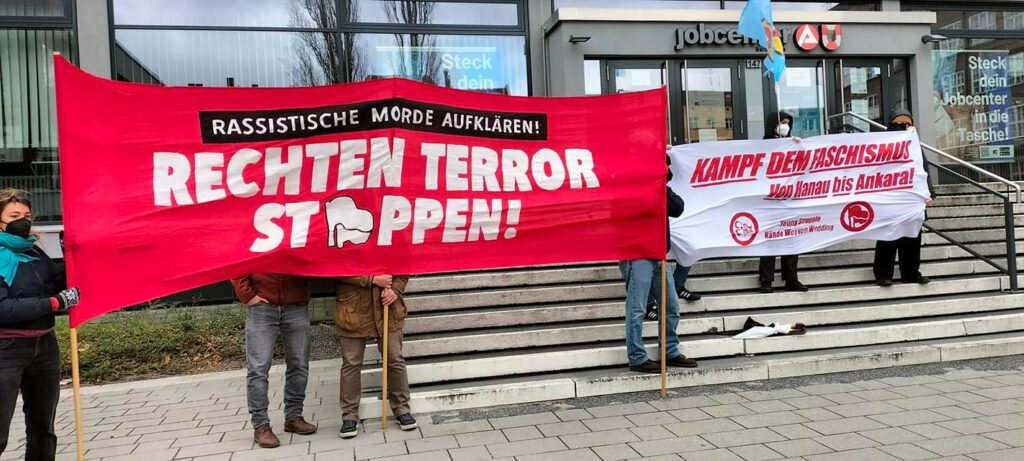
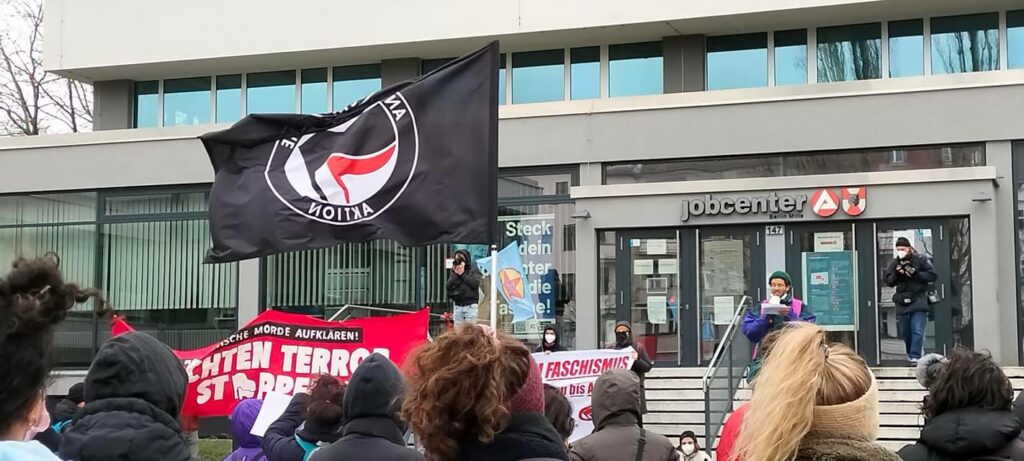
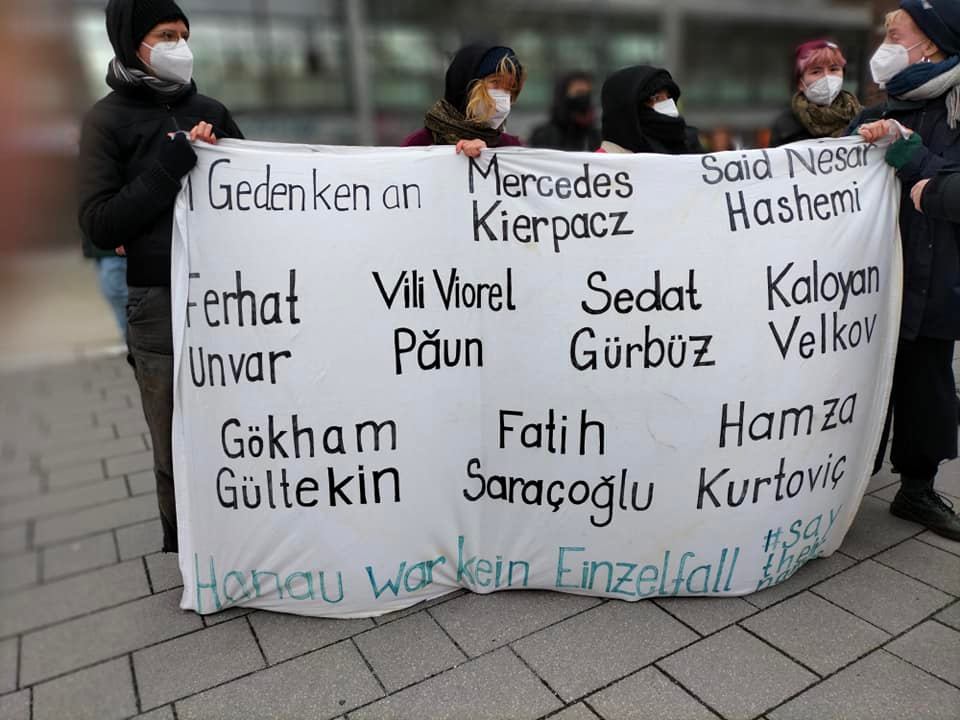
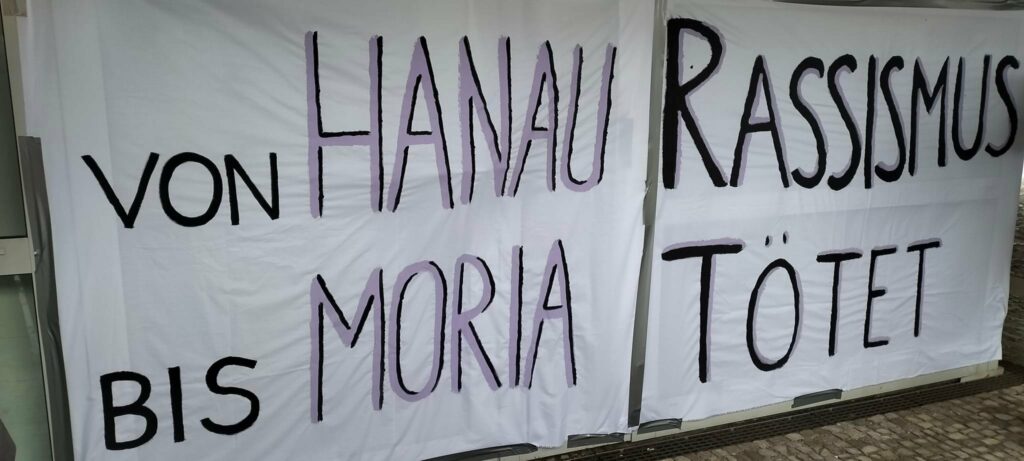
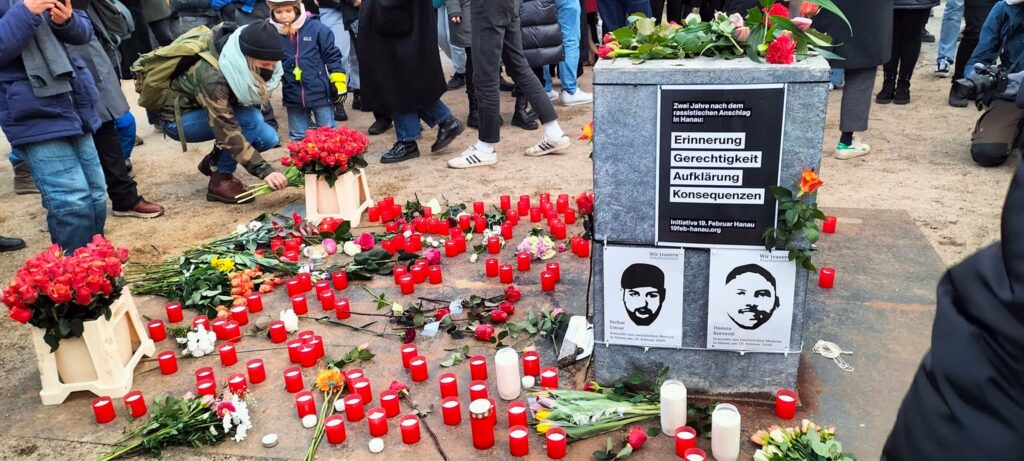
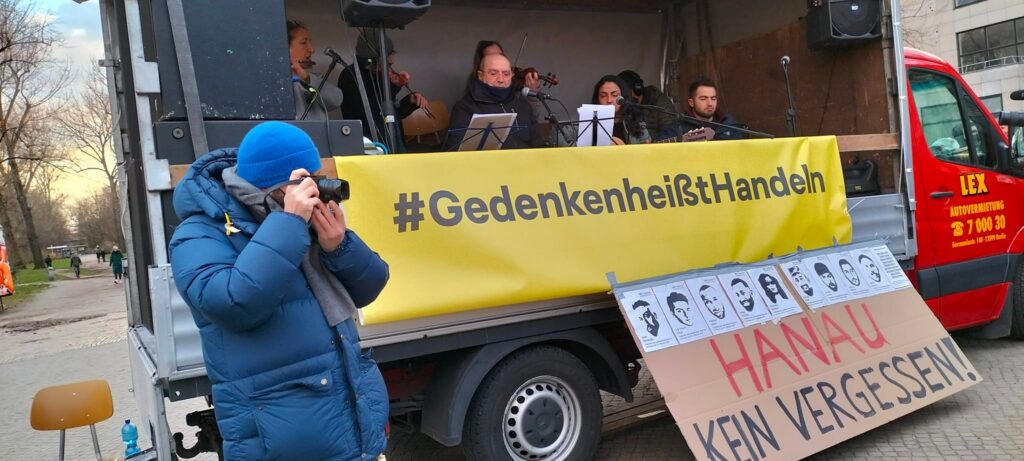
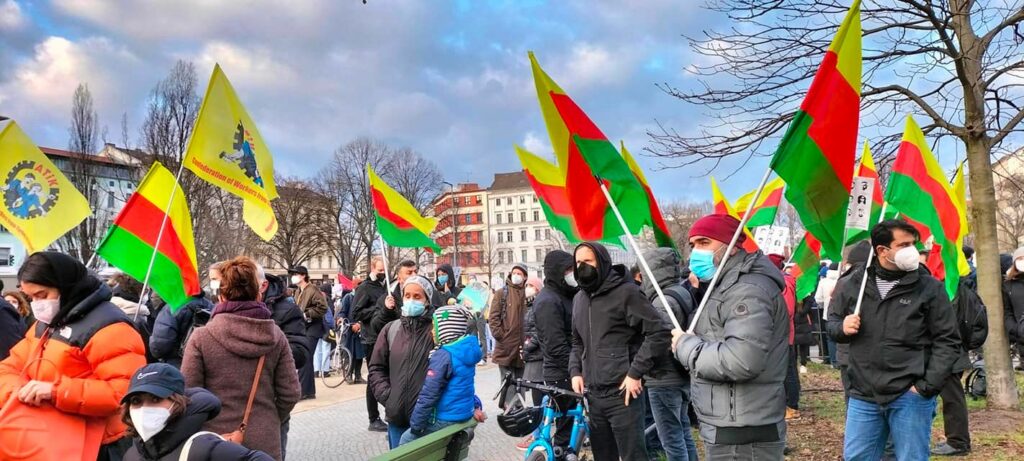
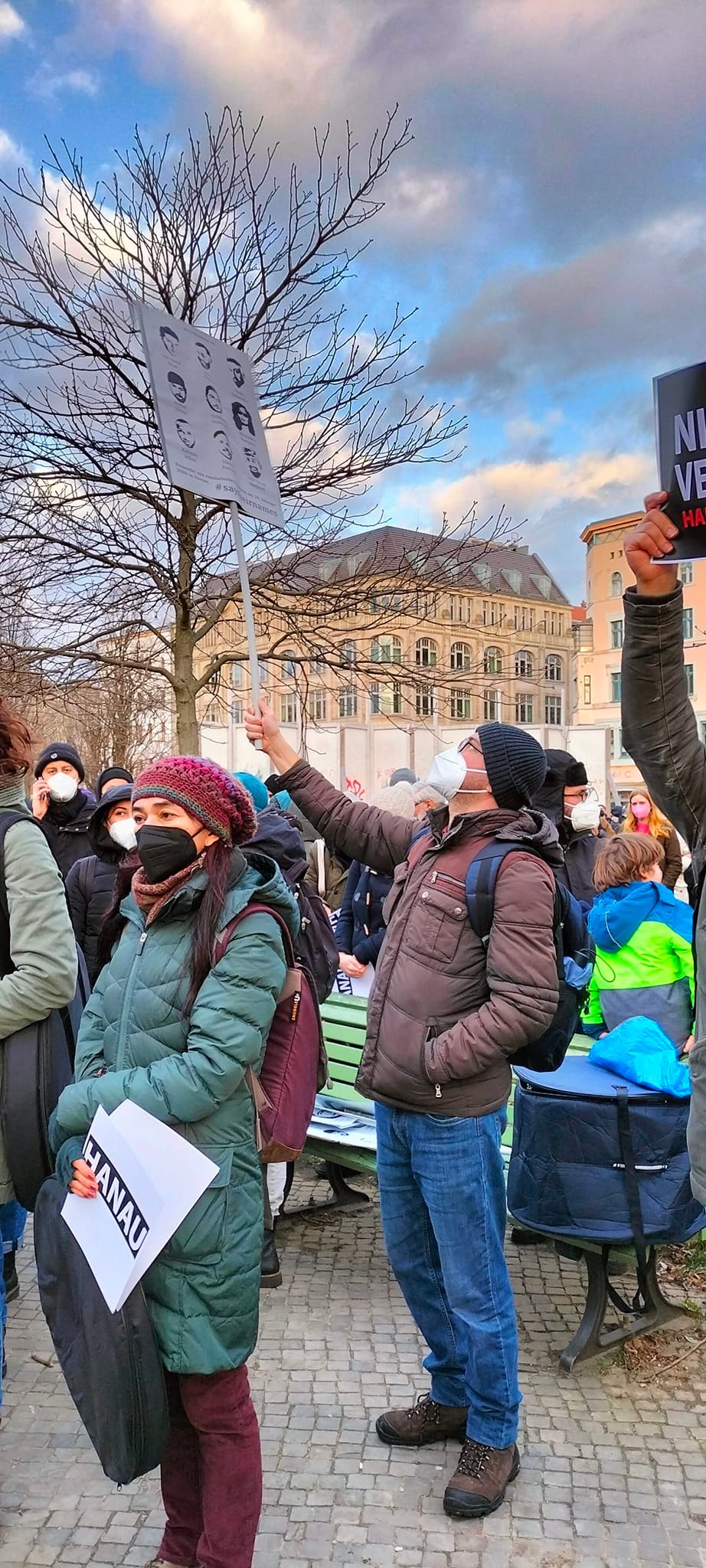
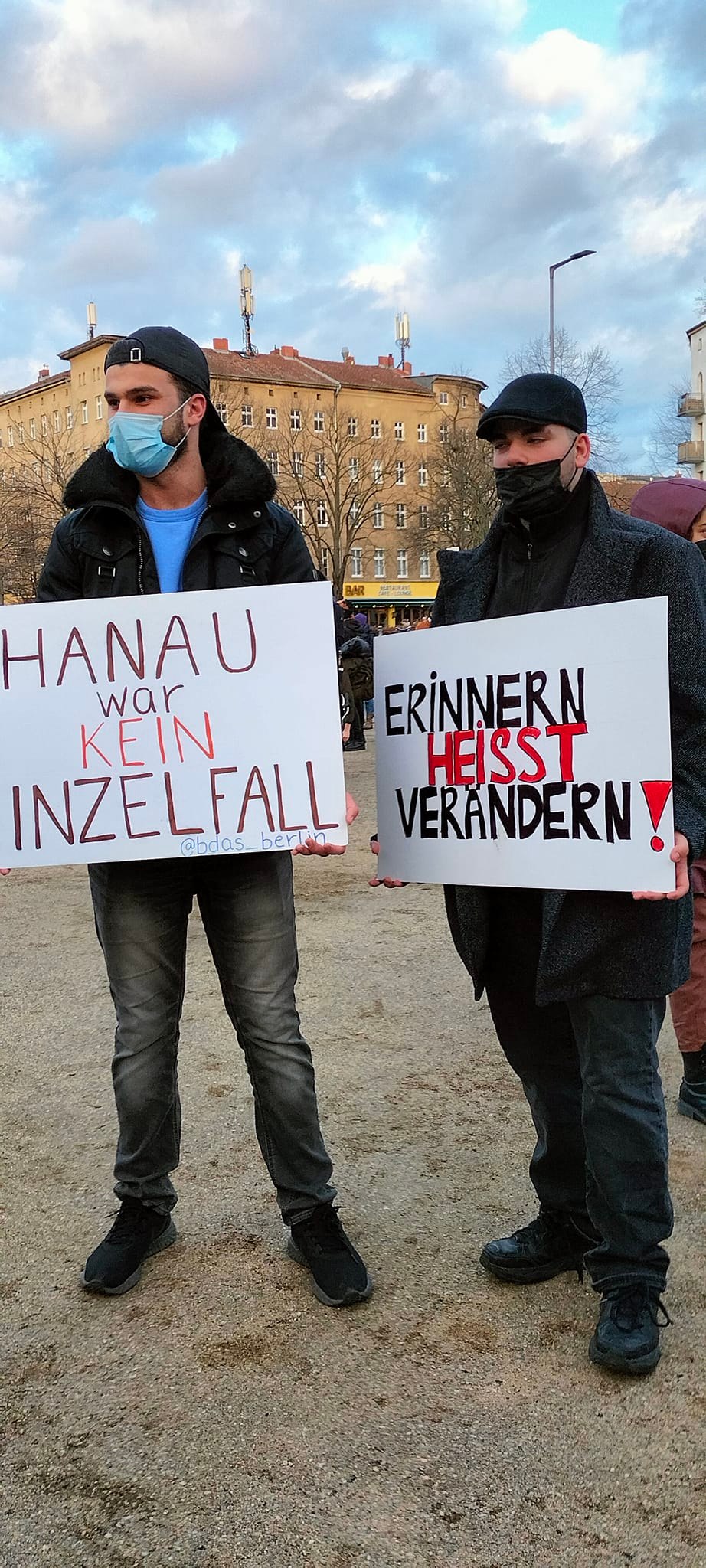
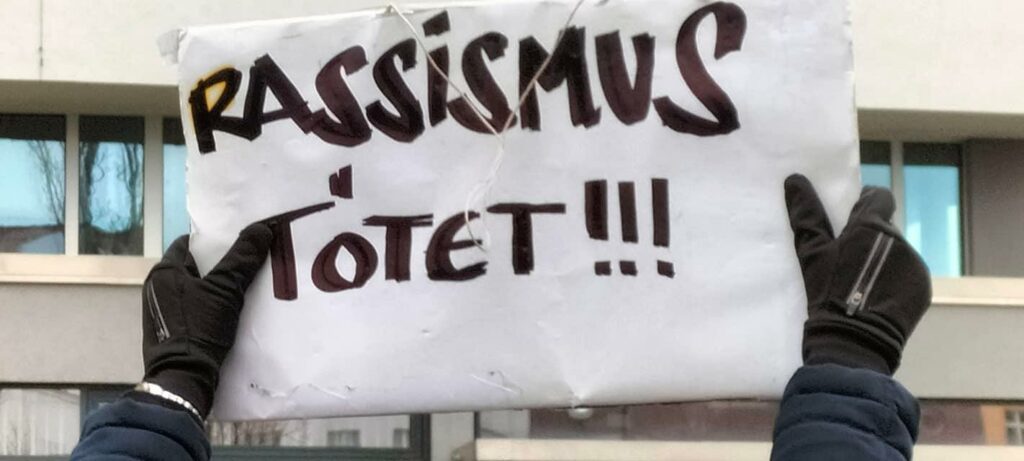
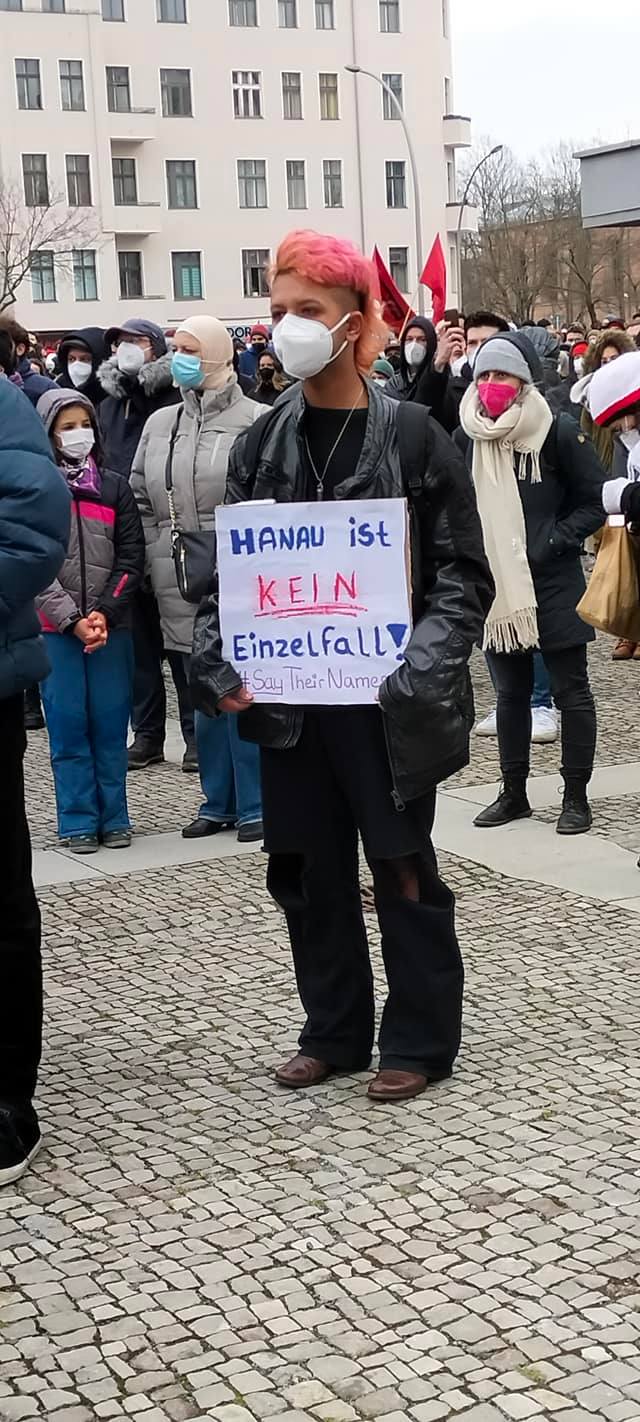
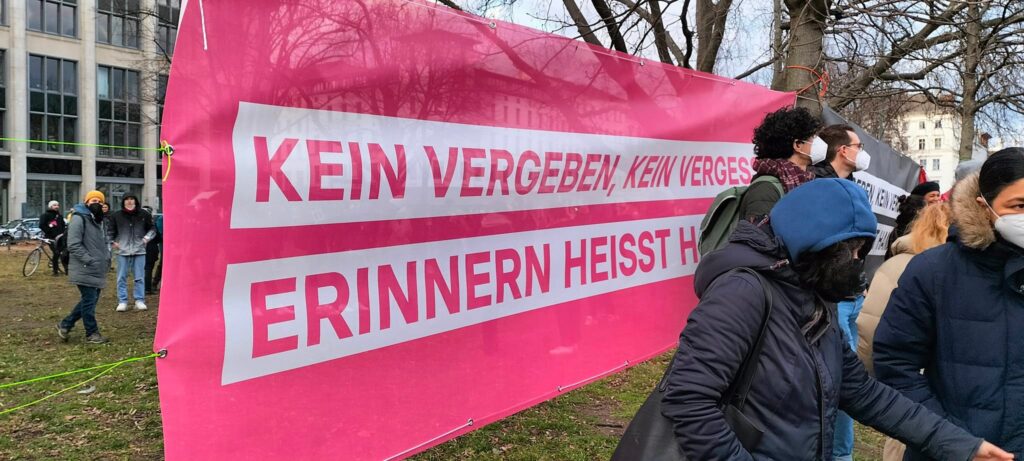
Photo Gallery – 2 years Hanau
Memorial rallies at Leopoldplatz (Wedding) and Oranienplatz (Kreuzberg), 19th February 2022
The Left Berlin
21/02/2022

Memorial rallies at Leopoldplatz (Wedding) and Oranienplatz (Kreuzberg), 19th February 2022
The Left Berlin
21/02/2022





























An initiative for EU legislation that will end illicit trade and profits from war crimes and human rights abuses
The Left Berlin
20/02/2022

To mark the World Day of Social Justice on February 20, a coalition of more than 100 civil society organizations has launched a European Citizens Initiative (ECI) to stop trade with illegal settlements in the occupied territories.
An ECI is an official instrument for democratic participation of citizens in EU policy making. If an ECI garners one million signatures from EU citizens over 12 months the European Commission must consider and debate the petition’s demands. This ECI demands EU legislation to outlaw trade with illegal settlements, anywhere and at all times, including trade with Israel’s illegal settlements in occupied Palestine. The coalition calls on every EU citizen concerned about human rights, social justice and fair trade to sign the petition.
Even though illegal settlements constitute a war crime under international law, the EU currently allows trade with them. In the case of Israel’s settlements, the UN Security Council has called on states to render them no assistance. The European Union has repeatedly declared that they constitute a flagrant violation of international law. Nevertheless, the EU continues to trade with them, which has emboldened their ongoing expansion.
Tom Moerenhout, a legal scholar and one of the initiators of the ECI:
“The EU has been shamefully inconsistent in its respect of the rule of law. Indeed, the European Commission first rejected registration of our Citizens Initiative, but had to change its position after we successfully sued the Commission before the European Court of Justice. The Commission has since acknowledged it can implement a general rule to stop illegal settlement trade that is considered a general measure in respect of international and EU law rather than a sanction.”
This European Citizens Initiative is carried out by the #StopSettlements coalition. It includes prominent civil society organizations in the field of human rights, environmental and social justice, trade unions and politicians who unite against profits from annexation and occupation to protect human rights, fair trade, and international peace.
Members of the coalition
The #StopSettlements coalition is a wide alliance of NGOs, grassroots movements, trade unions and politicians who unite against profits from annexation and occupation to protect human rights, fair trade, and international peace and stability.
Besides current atrocities such as Israeli settlements in Occupied Palestine, the coalition monitors the trend of territorial aggression in international relations. It wants the EU to send a clear signal that the hard lessons we learnt through history will be remembered and protected, and that profiteering from annexation and occupation will no longer be possible.
These are the coalition partners that support the initiative and request the Commission to regulate commercial transactions with Occupant’s entities based or operating in occupied territories by withholding products originating from there from entering the EU market.
European/ International:
Belgium :
France:
Finland:
Germany:
Luxembourg:
Ireland:
Italy:
Slovenia:
Spain:
Other European:
For more information about the Initiative, please contact Tom Moerenhout (tom@stopsettlements.org), Aneta Jerska (aneta@stopsettlements.org) or consult the #StopSettlements coalition website.
Interview with Tom and Carol from Radio Berlin International
Phil Butland
19/02/2022

Hi Tom, Carol. Thanks for agreeing to talk to us. Could you start by briefly introducing yourself and say what your relationship is to Radio Berlin International?
Carol: I’m Carol McGuigan. I presented the last program and was delighted to do that.
Tom: I’m Tom Wills, and I’ve been producing each episode of Radio Berlin International.
Radio Berlin International was launched at the end of last year. Tomorrow sees its fifth broadcast. How do you think it’s going so far?
Carol: I think it’s a very positive development in terms of this sphere of audio political news gathering, by giving a platform to activists. There aren’t that many platforms where people can do that.
Tom: I think it’s especially important that we’re talking to people who are actually organizing things and who are looking for people to get active. This can be lacking in left media. There can be a lot of analysis, which is very good, but less about people who are organizing stuff.
That doesn’t mean that everyone has to have a protest coming up. But it’s been great to have groups come in like the No Borders group who can talk about concrete actions. When you talk to people about events that are coming up, you already feel more connected to what they’re doing than if you were just handed a flyer or if you see the event on the internet.
Who do you think your main audience is, and how well are you connected to this audience?
Tom: One of the joys and mysteries of FM radio is that it’s hard to know how many people are listening. It could be 10, it could be 10,000. We do solicit emails from people, but we’re yet to really find out. However, we did a piece on an exhibition by Palestinian artists in Berlin and my partner was there and overheard people saying they’d heard about the exhibition on the radio.
The Berlin audience aren’t necessarily tuned into the German language. An English language broadcast is more accessible to them. But we also hope that we’ll reach people who are more confident with their German because we have such an internationalist focus.
I also hope that we will reach some people outside Germany who have an interest in what’s going on here. For example, Victor Grossman’s Berlin bulletin was about the Ukraine conflict is something that is relevant to people all over the world. I hope that we can also be of interest to people outside Berlin as well.
Carol: I think it’s a sort of word-of-mouth thing, because I would imagine that if somebody is going to be on it, they’ll tell their comrades and people they know. It’s available on the website, so it’s not like you have to tune in exactly on the Sunday. It’s the norm nowadays that people listen digitally rather than in real time.
I think the audience will build because of that. The range of issues is good and pertinent, whether it’s a Berlin-specific thing like the building of the deportation centre at the airport or something Germany-wide like the Hanau Massacre.
It takes time for a critical mass of audience to build up. But the more people are on it, they will exponentially build the audience. I hope that will be the case.
You mentioned the website. The radio program started as an offshoot of theleftberlin.com. What’s the connection between the two?
Tom: I definitely think we need both, if only for the mundane fact that some people like to read articles on the internet and some people like to listen to the radio. If I’m cooking or walking with the baby, there are times when I might be listening to the radio or a podcast, but there’s no way I’d be reading an article.
Something like half the population listens to the radio at some point during the week. It’s an important medium, and as the left, we’re missing something if we don’t try to provide some good radio.
Our work with the website collective is doing really well. When the website publishes a Campaign of the Week, they ask us if we want to speak to the campaign and invite them on the radio. Hopefully this will also happen in the opposite direction.
It’s not just about providing the same information in a different format. It’s a kind of connection to Berlin and the real world, which in some ways radio encourages. This allows us to pick up on things that are not necessarily so easy to pick up on when we’re doing text articles.
Carol: I would just add that there’s something about hearing someone’s voice that really humanizes whatever campaign they’re involved in. This makes it more accessible. When you read text, you can have presumptions about who is speaking. Whereas when you hear them speak and know they’re directly involved in what’s happening, you just hear the commitment in their voice, that they’re a real person, and you could join in with that.
Could you say something about reboot.fm, who host the programme?
Tom: They’re a long-standing artists-run community radio station. They’ve been going for at least 10 years and broadcast a lot of interesting experimental music. They have a few political talk shows, but not so many. Some of this stuff is in German and some of it is in English.
We approached them because they seemed to be a good fit in terms of the politics. They already cover some politics in German, and they immediately said they were interested in what we wanted to do. They’ve been a great support. They provide the studio and of course, they’ve got the infrastructure set up to actually broadcast.
If you’ve actually got an FM radio in your house and you tune into to 88.4 Megahertz, you can hear some interesting music. I think it’s a great platform, a great package of different material that it’s really good to be part of.
Carol: I was kind of vaguely aware of reboot.fm because I know one of the founders a little. But going to the tiny studio, then looking at the website, the diversity and breadth of stuff is so impressive.
Tom: I would also say actually part of the reason why I started listening to the radio more was that I wanted to get off social media and this never-ending information overload as well. If you’re not in the habit of having the radio on in the house, I would recommend giving it a try.
But I also like the fact that with radio, that if I’ve missed it, I’ve missed it. I’m not going to worry that I’ve missed something. If I happen to be in the kitchen and have the radio on, then I’ll catch something. If I don’t, I don’t, and I’ll get on with my life, and I’m not going to feel this burden of having a long list of things to read or a long list of things to listen to necessarily. So I do like the ephemeral nature of it as well.
You anticipated the next question, which is about the format. Radio feels a bit old-school. Every second person has got a podcast, yet you’ve launched a radio programme. Is there a reason for choosing this particular format?
Carol: I’ve listened to a couple of podcasts who say that their intention is to bring political issues into the public domain. And some of the podcasts seemed to prioritize a cool joshing before they get started on anything serious – sometimes even in the middle of serious bits.
They’re laughing and joking with each other and it feels like you’re eavesdropping on some mates who know each other hanging out and having a convo. I find that totally off-putting. It might be a generational thing, but I just never listen again. I just want to get to what the subject matter is.
So, I think there’s definitely room for a straighter, more direct reporting form of political radio from the left, especially with invited interviewees speaking more than the presenters. I don’t think that this is necessarily peculiar to radio. But there is something about the podcast thing where people think “This is my little project, and I’m going to make it all about me”. And after a while, that’s not that interesting. Sorry.
Tom: That’s a really important point. Also, on the radio, we can play music because FM has the license to do that. So that’s another whole dimension that we can use, which is not possible for podcasters.
We also have a fixed broadcasting schedule every two weeks, which means that we must be quite disciplined to get everything into that time. But I hope the result is something that people feel will be worth listening to. In those 60 minutes we’ll hopefully cover things that people are really glad to find out about.
In the interviews on the broadcast, you usually ask your guests to choose 1 or 2 pieces of music which relate to the interview. To put the boot on the other foot, which music would you choose to represent what you are trying to do?
Carol: I’ve got two suggestions. One of them was from a piece of street theatre that I saw last year that was staged in Kreuzberg, and it was a German protest opera called Lauratibor, which is an amalgam of the names of two streets in danger of gentrification. For me, affordable housing and the resistance to gentrification is a huge topic in Berlin. The song was at the end of the of the piece and it’s called “Widerstandslied” or “Resistance Song”.
Also just because of the hysterical beating of war drums in the Anglosphere, I would choose a track by Lowkey as an antidote, which is called “Refuse to kill”. It’s a beautiful track featuring the singer Kaia Laurielle.
Tom: My choice is a bit obvious: “The Revolution will not be Televised” by Gil Scott-Heron. I think this is relevant because on the one hand, we’re kind of trying to televise the revolution or at least put it on the radio. And he’s obviously completely right about the problems with the mainstream media.
We should also keep in our heads that the revolution won’t be televised and that there will be limits to what we’re doing on the radio. It does not replace organizing in your workplace or going on a protest march or any of these things. It’s a companion to those activities, but it isn’t the revolution, it’s media. It’s important, but we should also be clear about the limits of it.
This article is being published the day before the next programme on Sunday, 20th February. What have you got planned for tomorrow? And what else have you got in line for the future?
Tom: At the moment we’re expecting Christopher from the Essen Retten Leben Retten protests in the studio. He’s one of the environmental activists who’s been blockading motorways in Berlin, demanding a new law to stop food waste as part of efforts to tackle climate change. We’re also expecting Stefan Huth, who is the editor of the Junge Welt Newspaper as it’s their 75th birthday. We’ll be asking him about running a Marxist newspaper in a capitalist world.
Carol: I think it would be also good to kind of revisit campaigns. So, for example, with the No Borders assembly, to invite Coco back to see what the developments have been. At the show which I presented, Leila couldn’t come because of illness. It would be good to invite her on after the actions.
I’m really glad to hear you’ve got someone coming on talking about climate actions. And the health situation is important, particularly in hospitals. There are developments happening with the nurses in times of pay and conditions. This just seems to get left out by the mainstream media. There’s all this talk about vaccine passports and anti-vax protests, but hospitals being overwhelmed does not get investigated in the same way.
The other important issue is housing. There are all these empty properties in Berlin where people could be living. This must be addressed
One last question. People have read this article thinking Radio Berlin International is something they might like to get involved in. What can they do, and how can they contact you?
Carol: First, I don’t think non-English speakers should be put off. There is a script, so it’s not like have to kind of make it up on the spot. It would be good to get a big a range of committed people as possible.
Tom: I would also love for people to get involved in producing the show. Also, it’s really fun. It’s a lot about talking to people, listening to music, meeting people face to face as well. It’s a really nice way of being involved in that media.
Presenting doesn’t have to take up too much time. In theory, someone could just turn up an hour before the broadcast, get a quick briefing on what’s going on, and then go on air. At the same time, the presenter is a really important role because you are asking the questions.
People always do adapt to the script a little bit, based on their own ideas. Presenting is a really nice way to get involved, but there are other things. Say you are interested in going to a protest and doing a report about what’s happened, interviewing people, that kind of thing. This makes really, really interesting radio. We can give people the equipment and the know-how.
There’s also producing, which is really just a fancy word for organizing the guests and making sure that they’re there at 7:00 p.m. on Sunday. It’s really fun because you get to talk to lots of different people and be part of the programme as well, even if you don’t necessarily say anything. If that sounds interesting to you, email us at radio@theleftberlin.com.
Radio Berlin International broadcasts every second Sunday on Reboot FM 88.4 MHz in Berlin, 90.7 MHz in Potsdam and live online at reboot.fm. The next live broadcast will be on 20th February at 7pm, and will include an interview with Stefan Huth, editor-in-chief of the junge Welt newspaper.
Migrantifa Berlin was formed in the aftermath of the terrorist attacks of Hanau on 19 February 2020 where Vili Viorel Păun, Said Nesar Hashemi, Gökhan Gültekin, Mercedes Kierpacz, Hamza Kurtović, Fatih Saraçoğlu, Ferhat Unvar, Kaloyan Velkov und Sedat Gürbüz were murdered by a fascist. We are part of a wider network of Migrantifa groups across Germany.
Migrantifa Berlin is a group where people of migrant decent across various communities organise together, many of them born and raised in Germany. We consider ourselves a revolutionary organisation. We believe that people of migrant decent cannot rely on the state for their protection and security and that self-organisation is necessary in order to protect the lives of people in our communities. Therefore, our main focus is community organising in the neighbourhoods of Wedding, Neukölln, Kreuzberg and Lichtenberg.
We regularly organise anti-fascist neighbourhood walks as well as food, clothing, hygiene article distributions. Beyond the community organising aspect, we organise protests and educational events and engage in alliances with other migrant, anti-racist and/or revolutionary groups. We often serve as a connection between the German radical left scene and the anti-racist/migrant left.
We believe racism to be an integral part of capitalism, which serves as an ideology to justify the subjugation and exploitation of our people. Therefore, we believe that the only viable answer to the racism that we and our communities face is class struggle.
Weekly news roundup from Berlin and Germany

NEWS FROM BERLIN
Dilan Sözeri and the racist attack
Several drunken men and women racially harassed Dilan Sözeri on the tram, some days ago. She had the presence of mind to film parts of the attack with her mobile phone. No bystanders intervened, as can be seen on the mobile phone video. Many press outlets have presented the situation though as Sözeri was attacked because she was not wearing a mask. However, the 17-year-old, who has been hospitalised since the attack with a concussion, abdominal trauma and several bruises, does not want to let this go. Source: jW.
Life in the “Thermo”
According to a social study, the Lichterfeld “Thermometer” housing scheme needs “special attention”. Poorer people in Berlin are increasingly being pushed out of the inner city into the outskirts. This mainly affects Hartz IV recipients. According to research, in 2020 there were 35,000 fewer Hartz IV recipients living in the districts of Mitte, Friedrichshain-Kreuzberg and Neukölln than in 2007. In outer districts such as Spandau, Marzahn-Hellersdorf and Reinickendorf, however, the number of Hartz IV recipients increased by 28,000. The concentration of child poverty has increased dramatically in some Berlin neighbourhoods such as Reinickendorf, where about 6,000 people live, and the area around Maulbeerallee in Spandau. Source: Berliner Morgenpost.
Building without demolishing
Berlin was not her “place of choice”, but “one of the most fateful events of her life”, says the new Berlin Senate Building Director Petra Kahlfeldt (no party affiliation, for SPD). However, her appointment received sharp criticism in an open letter published on the website of the architecture and urbanism magazine “Arch+”. According to the letter, the architect does not stand for “participatory planning processes” and was co-author of a “Charter for Berlin’s Mitte” from 2014, which called for “extensive privatisation of public land” in the centre of the capital. Whether Kahlfeldt will be able to assert her convictions remains to be seen. Source: nd.
Rainbow flag and Hartz IV benefits canceled
The Berlin-based unemployment aid organisation “Ya Basta” reports on a case in which a job centre canceled the benefits of a recipient of unemployment benefit because of a rainbow flag attached to his balcony. The authority cited the flag as the reason the man formed a “community of need” with his flatmate, i.e. that he had an intimate relationship. In such cases, the authorities reduce or cancel the money that recipients of the basic income support would be entitled to if they were single. It remains the Job Centre’s secret why a rainbow flag on the balcony says anything about the relationship status of the person concerned. Source: queer.
NEWS FROM GERMANY
Neo-Nazi march mars Dresden remembrance
77 years ago, up to 25,000 people lost their lives in a bombardment during World War II in Dresden. Meanwhile, in the city center, hundreds of neo-Nazis gathered to the sound of Wagner to “honor” those victims of war. According to police, at the Heide cemetery, the homage passed by without problems. Near Dresden’s Old Town, though, less than three kilometers from the commemoration, around 750 neo-Nazis gathered on Sunday morning, holding banners to “remember Dresden’s war dead.” And, at the Zwinger Palace, hundreds of counter-protesters loudly opposed the far-right “silent march,” which was accompanied by shouts of “Nazis out”. Source: dw.
Jörg Meuthen leaves parliamentary group in the European Parliament
Former AfD leader Jörg Meuthen has left the Identity and Democracy Group in the European Parliament. “A group that tolerates a head of a delegation who defiles the memory of someone who has just died makes it completely impossible for me to continue as a member,” he said. This week, the AfD members of the European Parliament elected Nicolaus Fest as their new leader. The election took place despite the scandal surrounding Fest’s remarks following the death of the Socialist President of the European Parliament, David Sassoli. Fest wrote about Sassoli, among other things: “Finally this filthy pig is gone.” Source: Zeit.
Wake-up call for the peace movement
The danger of war in Europe is greater than it has been for decades. But slowly the peace movement seems to be waking up quite slowly. Calls for diplomacy instead of warmongering in the Ukraine crisis have found numerous prominent signatories from politics, academia and culture in recent days. The appeal “Ukraine crisis: peace policy instead of war hysteria!” by the initiative “Never again war,” helmed by the well-known peace activist Reiner Braun, was signed by more than 6,000 people within a week until last Monday. Protests on the streets are also being planned in the coming weeks. Source: jW.